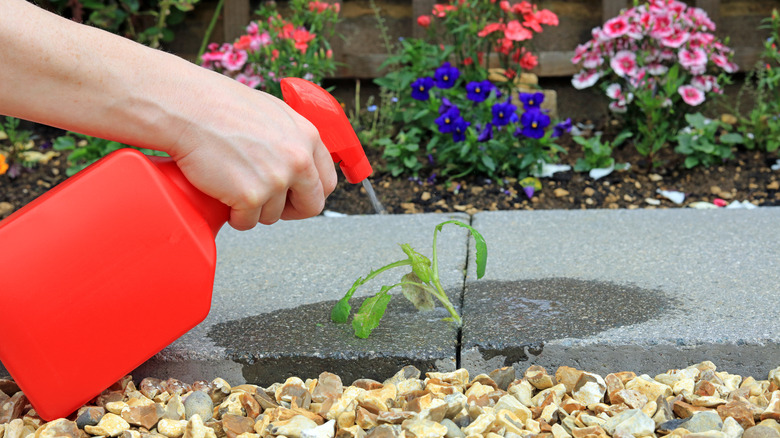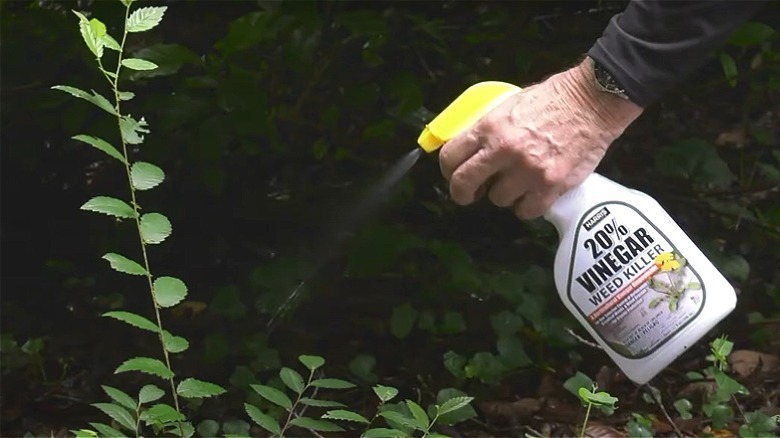Vinegar Vs Citrus-Based Weed Killer: Which Store-Bought Option Is More Effective?
We may receive a commission on purchases made from links.
These days, consumers have a growing awareness and preference for natural products, including skincare, food, and household cleaners. With an abundance of information, we can make more informed choices about buying products that are best for our health and the environment — and this includes the products we use in our yards. You may likely have heard about natural ways to kill weeds in your garden and even tried a few, such as pouring boiling water to get rid of weeds in gravel or spraying lemon oil to kill creeping Charlie weeds. Manufacturers are taking inspiration from these DIY concoctions and selling non-toxic herbicides with key ingredients like acetic acid (vinegar) or d-limonene, a derivative of citrus oils like orange and lemon. Both products are popular with customers looking for non-toxic options, but when it comes to effectiveness, reviews for vinegar sprays like Green Gobbler's 20% Vinegar Weed Killer come out on top.
Although consumer reviews for vinegar and citrus-based weed killers are mixed, the general consensus is that they are both worth a shot, especially if you are looking for a safe, organic option. Overall, however, vinegar sprays like Green Gobbler are better than citrus-based products like Avenger Weed Killer Concentrate. In addition, a study published by the USDA reported that adding orange oil to vinegar "showed little or no advantage" for killing weeds. Green Gobbler's spray is certified for organic use, and is recommended by the manufacturer for use on crabgrass, dandelions, clover, and more.
Both products kill weeds, but vinegar offers an extra edge
Both vinegar and citrus-based herbicide sprays work in similar ways. When applied directly on weeds, the solution dries out the leaves and stems that have been sprayed. Essentially, only the parts of the plant that come in contact with the spray are affected, which means the herbicide will likely be more effective on weeds with broad leaves versus grasses. However, the two products have slight differences. The D-limonene found in citrus oils works like a powerful degreaser (which is why many degreasing products contain citrus oil as a main ingredient) and dissolves the waxy coating on plant cells, making them susceptible to evaporation and dehydration. Acetic acid solutions can go a step further. Instead of just dissolving the coating, vinegar-based sprays work by rupturing the outer layer of plant cells and then destroying the cells themselves, causing water within to leak out. Vinegar solutions also work quickly, killing weeds in as little as a hour.
A downside with both of these natural products is that they don't reach the plant's roots, unlike stronger, more toxic weed killers like Roundup, which contains glyphosate. They may also be less effective on older, more established perennial weeds. Nonetheless, the results are quick, but you may need to repeat application to keep weeds under control. It's important to know that the ingredients in store-bought vinegar sprays are different than the vinegar from your pantry. Household vinegars typically have a concentration of 5% acetic acid, whereas herbicide sprays by manufacturers like Green Gobbler contain 20%. This makes them much more potent than DIY sprays.
Choosing the best option for your household
Although vinegar is popular and effective as a DIY herbicide, you've likely heard widespread reasons why you should think twice before using vinegar to kill weeds. It's non-selective, meaning that it doesn't discriminate; it will kill whatever plant it touches. If you're working on a concrete sidewalk or gravel bed, then this could be good news for you. But if the weeds are scattered among your beautiful flower beds, spray with care, especially on windy days. Options for both vinegar and citrus oil-based weed killers are available online at most major hardware stores. Ready-to-spray options for both formulas tend to be similarly priced — roughly $0.28 per ounce — so cost shouldn't be a major factor in determining which solution to use.
Another factor to consider when choosing between a vinegar or citrus-based weed killer is its impact on you and your household. Consumers rave about the scent of the citrus products and warned about the intense odor of vinegar-based products, which can be a deal breaker if you're particularly sensitive to odors. Both types of sprays are advertised as being safe around children and pets, but it's a good idea to wait 24 hours before letting kids and animals play around the recently sprayed areas. Also, keep them away while you're spraying. While the vinegar in your pantry won't hurt if it splashes on you, one with an acetic acid concentration greater than 11% can burn your skin or even cause blindness or other eye injuries. For extra precaution, wear protective goggles and gloves while you spray.


